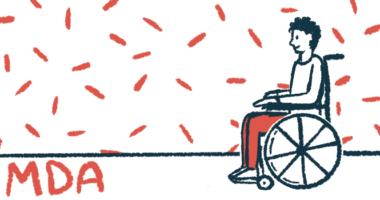Apitegromab Showing Potential to Ease Fatigue, Aid Life Quality
New TOPAZ extension trial findings in SMA patients given two years of treatment

Continued treatment with apitegromab, designed to strengthen muscles, led to stabilization or improvement in measures of fatigue and life quality for children and young adults with types 2 and 3 spinal muscular atrophy (SMA), according to new data from the TOPAZ clinical trial.
According to apitegromab’s developer Scholar Rock, these measures show trends of continuous improvement over two years of treatment, and they complement earlier data trial showing the experimental therapy’s use led to gains in motor function.
“SMA can have a significant impact on the ability to perform daily activities but there is limited research on potential interventions to improve quality-of-life measures, such as increasing muscle endurance and reducing fatigue,” Jay Backstrom, MD, CEO of Scholar Rock, said in a company press release. “These positive TOPAZ data indicate sustained improvements of quality-of-life measures over 24 months in the patient population studied.”
The open-label Phase 2 TOPAZ trial (NCT03921528) enrolled children and young adults, ages 2 to 21, with SMA type 2 or type 3.
Participants, divided into three groups, were treated for one year in the main trial. The first group included patients ages 2 and up who could not walk and had started treatment with Spinraza (nusinersen) before age 5. They were given apitegromab at one of two doses (2 or 20 mg/kg) in addition to continuing on Spinraza.
The second group enrolled patients ages 5 to 21 who could not walk and started on Spinraza after age 5. Patients in third group, also ages 5 to 21, were able to walk. People in both these groups received apitegromab at 20 mg/kg, usually in addition to continuing Spinraza.
54 SMA patients being treated with apitegromab for a third year
In all groups, apitegromab was administered via infusion into the bloodstream every four weeks; 11 patients in group three were treated with apitegromab only (monotherapy).
Of the 55 patients who finished two years of treatment in TOPEZ’s ongoing extension study, all but one chose to continue for a third year. TOPEZ’s extension is tracking long-term outcomes with the therapy; the trial is due to conclude in April 2024.
New data include outcomes for a standardized measure of fatigue severity called the Patient Reported Outcome Measurement Information System (PROMIS). Among 10 type 2 patients, ages 2 or older who had started on Spinraza before age 5, PROMIS scores were stable or improved over two years of apitegromab’s use. The highest average improvement reported from the study’s start (baseline measure) was five points.
PROMIS scores also rose, by an average of up to 3.5 points, in two patients between ages 5 and 21 who started on Spinraza at age 5 or later.
The Pediatric Evaluation of Disability Inventory-Computer Adaptive Test, or PEDI-CAT, measures the abilities of young people across three domains: daily activities, mobility, and social cognition.
Among 14 participants who had started on Spinraza before age 5, PEDI-CAT scores were stable or improved up to an average change from baseline of three points. Data covering eight patients who started on Spinraza later showed stabilized or improved PEDI-CAT scores up to an average of 0.7 points.
Among patients who started on Spinraza at age 5 or later, trends toward improvement on the Endurance Shuttle Box and Block Test (ESBBT), a measure of muscle endurance, were also seen. These trends were consistent with previously reported improvements in motor function tests, according to Scholar Rock.
Apitegromab has been well-tolerated overall throughout two years of the TOPAZ trial, with no deaths or serious side effects reported. The most common safety-related findings reported include headache, fever, cough, and the common cold.
Scholar Rock is sponsoring a Phase 3 clinical trial called SAPPHIRE (NCT05156320), which is testing apitegromab against a placebo as an add-on treatment in up to 204 young people with SMA types 2 or 3 using Spinraza or Evrysdi (risdiplam). The study is currently enrolling participants at sites in the U.S. and Europe.
“As the Phase 3 SAPPHIRE trial advances, these additional TOPAZ trial analyses coupled with the previously reported measures of motor function … continue to yield positive, consistent results, building the case for apitegromab as a promising new treatment option for patients with SMA,” Backstrom said.








